A product that is uniform and consistent throughout a particular market, that has pricing based on a set market baseline, like the Chicago Board of Trade (
CBOT), and can be reserved/booked out into the future. These market baselines like the CBOT take into account both supply and demand, as well as other environmental and political aspects that may affect pricing.
A production method that does not use any added heat in the extraction or pressing process. In the case of oil, this means that no heat is added in the process of getting the oil out of either fruit or seeds. A cold pressed oil also requires that the extraction process doesn’t cause enough friction to bring the product to a high temperature on it’s own — even if no heat was separately added.
Read More
Oil produced from the fruit or copra of the coconut. This oil is typically solid at room temperature (unless it is MCT Coconut Oil, which is a liquid version of coconut oil).
Read More
A
tote made from an outer cardboard material (as opposed to a
plastic tote). This cardboard is very thick, and is as strong as the plastic totes. Cardboard totes can be made by many manufacturers, but one of the most common is SpaceKraft.

Oil made from the seeds of the canola plant. The canola plant is a “sister plant” to the rapeseed plant. Rapeseed plants have higher levels of eurcic acid (levels which are safe for cows but not for humans) than the modern canola plant. This transition to the canola plant was done in the 70s through traditional breeding methods (think of Gregor Mendel’s pea plants) before the rise of genetic engineering. To produce better yields, it became standard practice for the canola plant to be genetically modified in the 90s. These canola plants can now be grown in non-GMO or GMO (conventional) varieties, and both are used for both meal and oil production.
Read More
Bulk is a term that refers to “large volumes” of something, in this case oil. Bulk oil is typically considered a pallet (around 250 gallons) of oil or more. Some people (often home consumers) refer to bulk oil as anything more than one gallon — bulk can be a relative term. However, in the manufacturing world, bulk is typically large packaging sizes (like a tote) or a volume of one
pallet or more.
A person or company re-selling the finished goods of other suppliers. Brokers can be advantageous to work with if they understand and can offer market knowledge, or new channels of supply or logistics. They are often individuals or small groups with good relationships and low overhead (aka, they don’t run their own production / packing facilities). However, they are often an added link in the supply chain which can add cost to your final delivered price.
Read More
An acronym for Chicago Board of Trade. Now run by the CME Group, this online market-tracking tool shows the
board (or current market) for different commodities, including Soybean Oil. This market indicator is used as a component in the final pricing of commodity soybean and canola oil.
A shorthand for the Chicago Board of Trade or
CBOT. The board is a baseline (similar to the NASDAQ, S&P 500, or Dow Jones Industrial Average in the financial world) that commodity prices for products like soybean and canola oil are based off of, and indicates the state of the market for commodity oils. Similar to the stock market, this number is always shifting while the market is open, and commodities can be reserved on a contract out into the future. These numbers showing the expected market in months to come are called “futures”. However, this indication is just one part of the equation when it comes to the final price of commodity oils.
A contract which does not specify a particular volume, but allows you to order any quantity of a product at an agreed upon price for a period of time. These types of contracts are unusual in the edible oil / agriculture industry, as they deal with a lot of unknown factors (volume, supply availability, etc.).
Read More
